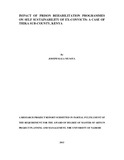Impact of Prison Rehabilitation Programmes on Self Sustainability of Ex-convicts: a Case of Thika Sub-county, Kenya
Abstract
Kenya prison service main objective is to rehabilitate offenders who have been sentenced to
serve various lengths of sentences in the penal institutions. In order to achieve this objective,
they engage the inmates in various rehabilitation programmes aimed at equipping them with
adequate skills to become self reliant, useful to the community and avoid re offending once
through with their jail terms. The purpose of this study was to explore the impact these
rehabilitation programmes have on the inmates self sustainability once they exit these prison
facilities. The study was carried out in Thika sub-county in Kiambu County. The study had
five objectives which include: to investigate the extent to which formal education
programmes offered in Prison impact on the self sustainability of the ex-convicts, to assess
how vocational training offered in Prison impact on self sustainability of the ex-convicts, to
explore the extent to which the attitude of the prison inmates towards the programmes offered
in prison impact on the self sustainability of the ex-convicts, to assess how the prison
environment impacts on the self sustainability of the ex-convicts and establish the extent to
which the aftercare support impacts on the self sustainability of the prison ex-convicts. In
order to understand the prison rehabilitation process and programmes offered to the inmates,
the study looked into literature related to the same and looked at studies carried out at global
level, Africa and Kenyan situation and analyzed critiqued the same in search of insight for
full understanding of the topic. The conceptual framework had taken into account the five
independent variables and explained how they relate with the dependent variable. The study
was targeting 320 ex convicts from which it drew a sample of 175 of both gender using
simple random sampling. Descriptive Survey design was used for the study and data
collection instrument used was questionnaire which was administered by research assistants
who helped the respondents fill the same. The data was analyzed with the help of statistical
package for social sciences (SPSS) version 21.0 and presented using, frequencies and
percentages. The study found out that, 73.6% of the prison ex-convicts had undertaken
vocational education programme in prison. In addition, 76.6% of them felt that formal
education had no impact on their self-sustainability. A small percent of the 15.7% of the ex-convicts
felt that vocational training had an impact on their self-sustainability. The study
found out that 98.6% of the ex-convicts had received life skill training. Though the skills
could be useful to the inmates, 85.6% of the ex-convicts felt the training had no impact on
self-sustenance in their current situation. The study established that 78.4% of the ex-convicts
had no freedom to choose a course of their own. The study revealed that, 79.5% of the
respondents rated the prison conditions as poor and only 12.5% saw the conditions as good. It
also established that 73% of the ex-convicts who are self-employed felt that their jobs where
not a result of the training they underwent in prison. However, 52.3% of those ex-convicts
who were in formal employment attribute their employment as a result of the training they
undertook in prison. The study also found that 92.6% of the ex-convict had not received any
kind of assistance since release from prison. All the ex-convicts cited lack of capital and lack
of tools and materials as the biggest challenges facing them.
The study recommended that the government should improve on the rehabilitation
programmes offered and come up with modern, relevant, need based and market oriented
courses, provide tools and startup capital to enable the ex-convicts carry out their trade after
release from prison. In addition, it recommends that ex-convicts should be allowed to select
courses of their choice which are within their ability.
Citation
Master of Arts in Project Planning and ManagementPublisher
University of Nairobi

